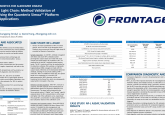Massachusetts’ Robert Gerszten wins an Agilent Technolgies’ award to support metabolite profiling studies

Robert Gerszten, a pioneer in the use of proteomics and metabolomics approaches to biomarker discovery, is the most recent recipient of an Agilent Thought Leader Award from Agilent Technologies Inc.
Robert Gerszten, who is the director of clinical and translational research at Massachusetts General Hospital’s Institute for Heart, Vascular and Stroke Care (MA, USA), will receive funding for personnel to support his work on metabolite profiling of well-phenotyped human populations. He will also be provided with scientific and technical support from Agilent themselves in metabolomics, automation and integrated biology.
Gerszten’s metabolic biomarker hunting focuses on cardiovascular and related metabolic diseases and his work has included populations from the Framingham Heart Study. “Our goal is to identify new metabolites and proteins that mark disease activity, signal disease progression, and ultimately provide targets for therapeutic intervention,” he explained. “We are grateful that Agilent supports our research and is helping us in our quest to advance translational cardiology.”
The Agilent Thought Leader Award program is designed to support fundamental advances in the life sciences and chemical analysis through philanthropic financial support, expertise and products provided to thought leaders.
“Agilent is proud to support Gerszten’s research in this pivotal project and further advance progress in the important field of cardiometabolic diseases,” commented Agilent Chief Technology Officer, Darlene Solomon, the executive sponsor of the award. “By providing support and cutting-edge technologies to leading translational researchers like Gerszten, we aim to facilitate innovative research and to progress the fields of metabolomics and integrated biology toward improved patient outcomes.”
Previous recipients of the award have included Jens Frisvad (Technical University of Denmark [Lyngby, Denmark]; March 2012) for his work which includes exploring molds for new enzymes and metabolites which could be used for new drugs, and Russell Thomas (Hamner Institutes for Health Sciences [NC, USA]; December 2011) for his research into methods for predicting drug-induced liver injury.






